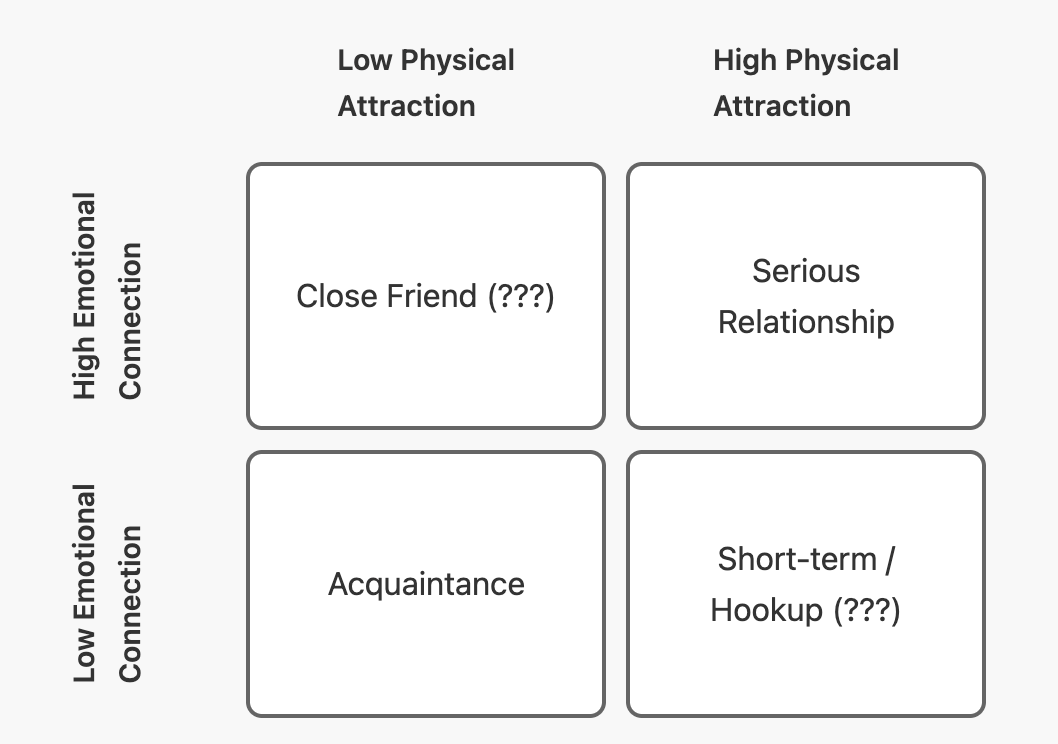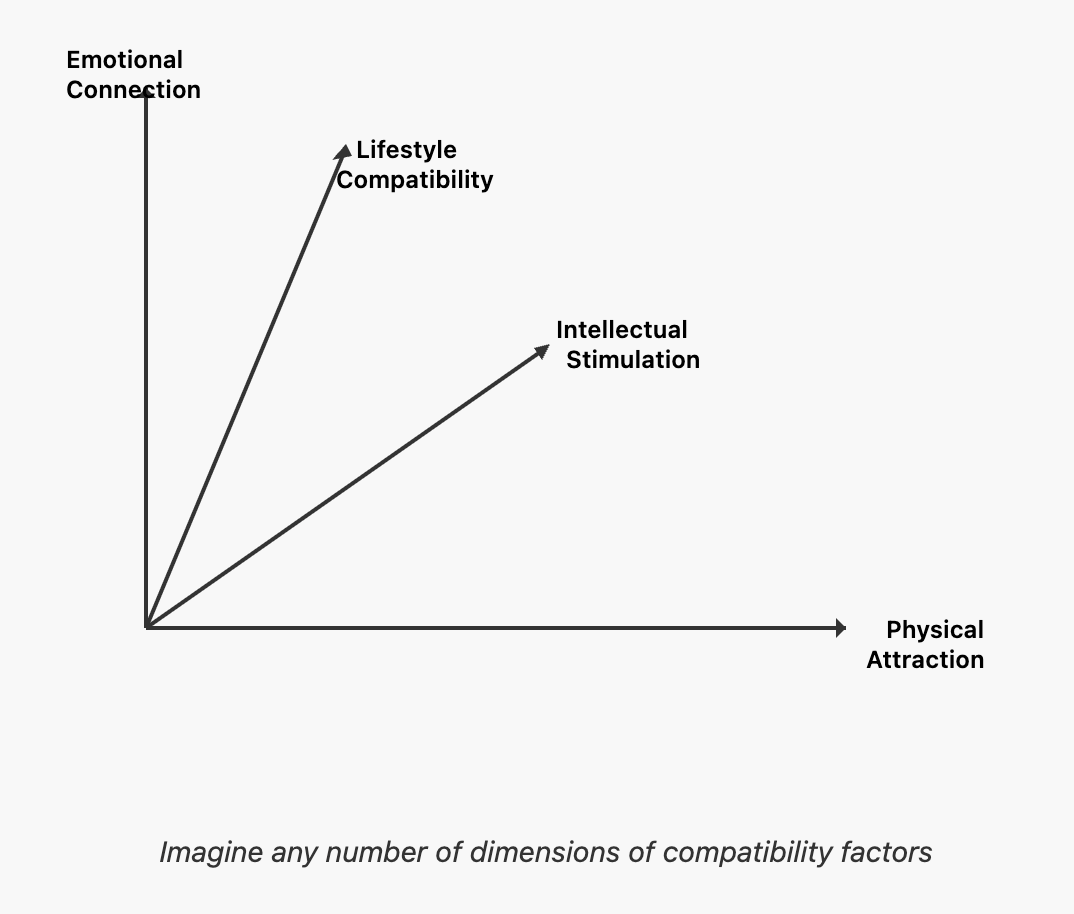Understanding Relationships

I’ve been chatting with a few female friends about dating.
Dating in New York, they say, feels like every guy operates with the emotional depth of a vending machine: Insert coin, select option A (situationship) or B (serious), dispense relationship if available.
Meanwhile, I’ve had conversations with guys who brag about “only doing long-term relationships” as if it’s a personality trait, a mark of maturity, and “situationships” are beneath them. There’s some cognitive dissonance between these two observations, and it got me thinking about how I understood relationships when I was younger, and how I suspect many men still do.
I think for a lot of men their understanding of relationships stops developing shortly after high school.
The Two Boxes
When you’re fifteen, your model of attraction is almost beautifully simple:

This works fine when your entire romantic life consists of asking someone to homecoming.
The Three Boxes
At some point, usually in college, the model gets one upgrade:

Now there’s a distinction between “girlfriend material” and “just hooking up.” This is where a lot of men seem to stick around.
It works well enough, until it doesn’t.
For example, incels who box themselves into this model ending up feeling trapped, without understanding of why or how to move. Or “nice guys” who can’t comprehend why being in the “serious” category doesn’t guarantee reciprocation. Both are casualties of an underdeveloped framework.
The problem is that men aren’t encouraged to talk about relationships with nuance. Society doesn’t give men spaces to discuss emotional needs without seeming weak. So most guys just don’t end up thinking about this stuff, and don’t develop a mental model past this point.
In the worst case, their ideas of relationships might be adapted entirely out of unrealistic Hollywood movies.
The Four Boxes
Here’s a simple, if slightly reductive, next step: considering attraction beyond a single dimension.

This is already more useful. It explains why you might have incredible chemistry with someone physically but know it wouldn’t work long-term. Or why you have that friend you’d trust with your life but have zero romantic interest in.
But we’re still thinking in boxes.
The Spectrum
Neither axis is actually binary. They’re spectrums. Emotional connection isn’t just on or off:
Emotional Connection Spectrum:

Physical Attraction Spectrum:

You can see then, along any measurement there can be multiple breakpoints for which we have different considerations.
But even this is oversimplified.
Infinite Spectrums
At the fully generalized level, there are unlimited dimensions to compatibility and attraction.
Some aspects of physical compatibility: height, facial symmetry, body type, voice, smell.
Some aspects of emotional compatibility: shared values, communication style, humor compatibility, intellectual stimulation, emotional availability.
Then there’s: lifestyle compatibility (introvert vs extrovert energy, travel preferences), ambition alignment, family planning views, financial compatibility, social circle overlap, sexual compatibility, shared interests…
There are infinitely more, and each of these individual points is itself a vector; A spectrum of possibility, and each person has a different calibration on how much they care about that factor.

Every person you meet scores differently across all these dimensions. You don’t actually need someone to score high on everything.
What You Get From Relationships
Zooming out for a moment, let’s talk about what relationships are.
Social relationships are rarely rigorously defined. Different relationships meet different needs, and that’s exactly how things should work.
From relationships of various kinds, you might get:
- Emotional support - someone to process life’s challenges with
- Perspective - different viewpoints on your problems
- Accountability - someone who pushes you to be better
- Shared experiences - memories and adventures
- Intellectual stimulation - challenging conversations
- Physical intimacy - but this is just ONE dimension
- Social connection - reduced loneliness, feeling seen
- Personal growth - someone who challenges your assumptions
- Practical support - help with life logistics
- Network effects - meeting their friends, professional connections
- Validation - feeling desired and appreciated
Repeating what I wrote above for emphasis: different people meet different combinations of these needs, and that’s the point.
Your close friends might provide emotional support, intellectual stimulation, and accountability, but not physical intimacy. That’s not a “lesser” relationship; it’s just a different configuration.
A casual dating “situationship” might meet physical attraction, shared experiences, and validation, but not deep emotional vulnerability or life planning. That doesn’t make it meaningless; it makes it honest about what it is.
A work friend might provide intellectual challenges and practical career advice but you’d never discuss your relationship problems with them. Still valuable.
Mature Relationships
In my experience, people, especially men, pigeonhole themselves into certain boxes of what relationships can and can’t be. But you should not.
Here’s a potentially healthy, mature understanding of relationships:
1. Every relationship should be different, even changing over time depending on what dimensions you and the other person mutually fulfill. There’s no template. Each person you meet is extraordinarily unique, and your relationship to each person should similarly be unique.
2. Labels like “serious” and “casual” are lazy shortcuts. They don’t actually communicate what you mean. Better to be explicit: “I’m interested in seeing you regularly and being physically intimate, but I’m not ready to integrate our social circles” or “I value our emotional connection but don’t want to complicate it with physical intimacy.”
3. This requires three things:
- Self-awareness: Understanding what you actually want across all these dimensions
- Communication: Honestly and clearly sharing your thoughts and boundaries without hiding behind vague labels
- Respect: Accepting when someone wants something different and not trying to convince them otherwise
4. Which means that mismatches are okay. You might score someone as 9/10 on intellectual compatibility and 3/10 on lifestyle compatibility. They might rate you completely differently on the same dimensions. That’s not a failure, but rather incompatibility. This happens a lot, but trust yourself to be able to find someone who matches better. You both deserve a good fit.
The Problem
Early-stage dating, especially off of dating apps where a lot of new encounters happen, is rather adversarial - you need to uncover your partner’s intentions without playing your hand too quickly - and so in that sense it’s hard to be open and align on expectations and even understandings of what relationships are.
If they don’t have the same framework you do, it’s hard to work together. And because you’re adversarial, you’re not in a place to introduce them to a different framework; Your incentives may be misaligned. They may not trust you.
It’s a hard problem, but I think it ends up as another part of the compatibility matrix. A person’s framework for compatibility is itself a dimension; It’s hard to communicate the nuances of what you’re looking for if your partner is stuck thinking about relationships as a Nicholas Sparks novel where Prince Charming always gets the girl with wildly ridiculous romantic gestures.
Alternatively you could link them this article as an impartial third-party point of view and hope it clicks. Best of luck, reader!
Why This Matters
When I hear my female friends complain about dating guys in New York, I think what they’re really saying is: these men are still operating with a three-box model in a world that requires n-dimensional thinking.
They can’t articulate what they want beyond “serious” or “casual.” They can’t recognize that someone might be amazing in some dimensions and incompatible in others. They definitely can’t communicate nuance about what kind of relationship would actually work for them or what they’re looking for.
And when I hear guys brag about “only doing long-term relationships,” I hear someone who’s proud of having exactly one setting. That’s not maturity, it’s inflexibility and lack of understanding dressed up as virtue.
I saw a quote on Instagram recently: “friends with benefits but the benefit is just having a friend.” Sometimes men act like physical intimacy is the primary dimension and everything else is secondary. But that’s exactly the reductive thinking that gets us stuck.
Real maturity is understanding that relationships exist on multiple spectrums, that different people meet different needs, and that being explicit about what you want and what you can offer is the most respectful thing you can do.
It’s a lot more complex than the binary we started with. It’s a lot harder. But it’s also a lot more honest and more rewarding in the long term.
If you’re reading this and recognizing yourself in the three-box model, I hope this gives you a framework to think more holistically about the relationships in your life. And if you’re someone who’s been frustrated by people stuck in that simpler view, maybe this helps you understand where they’re coming from, even if it doesn’t excuse it.
← Back to home